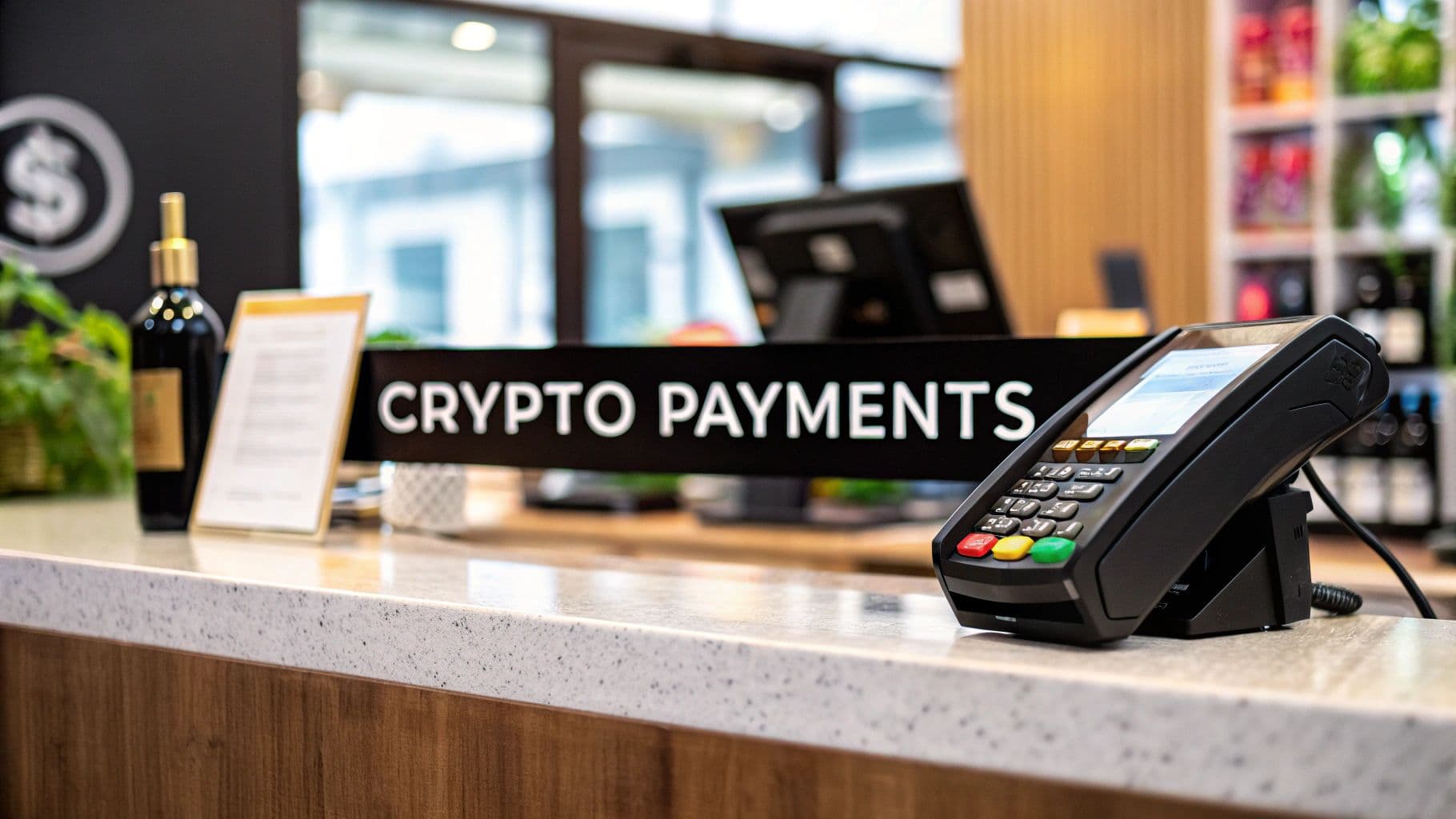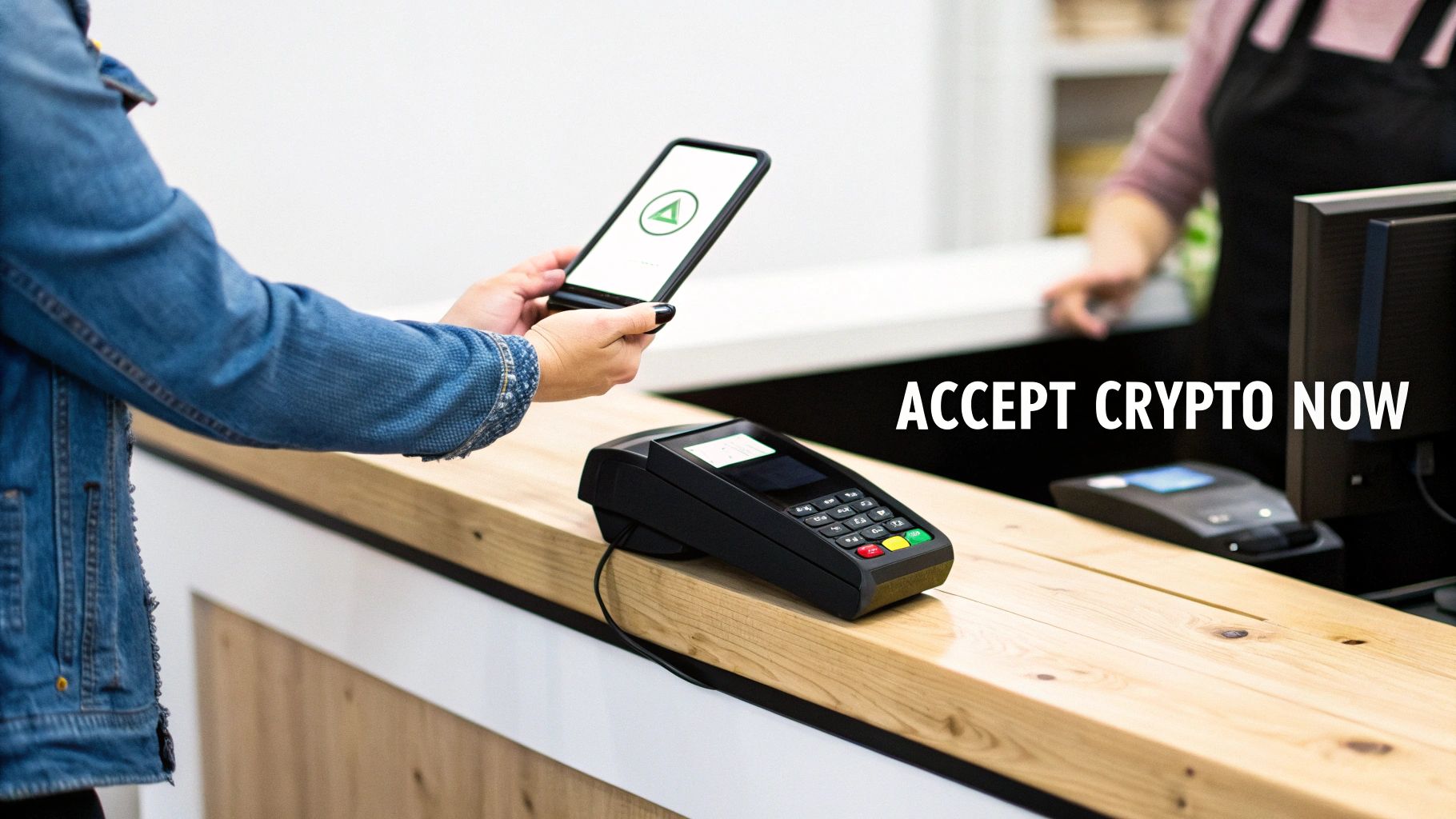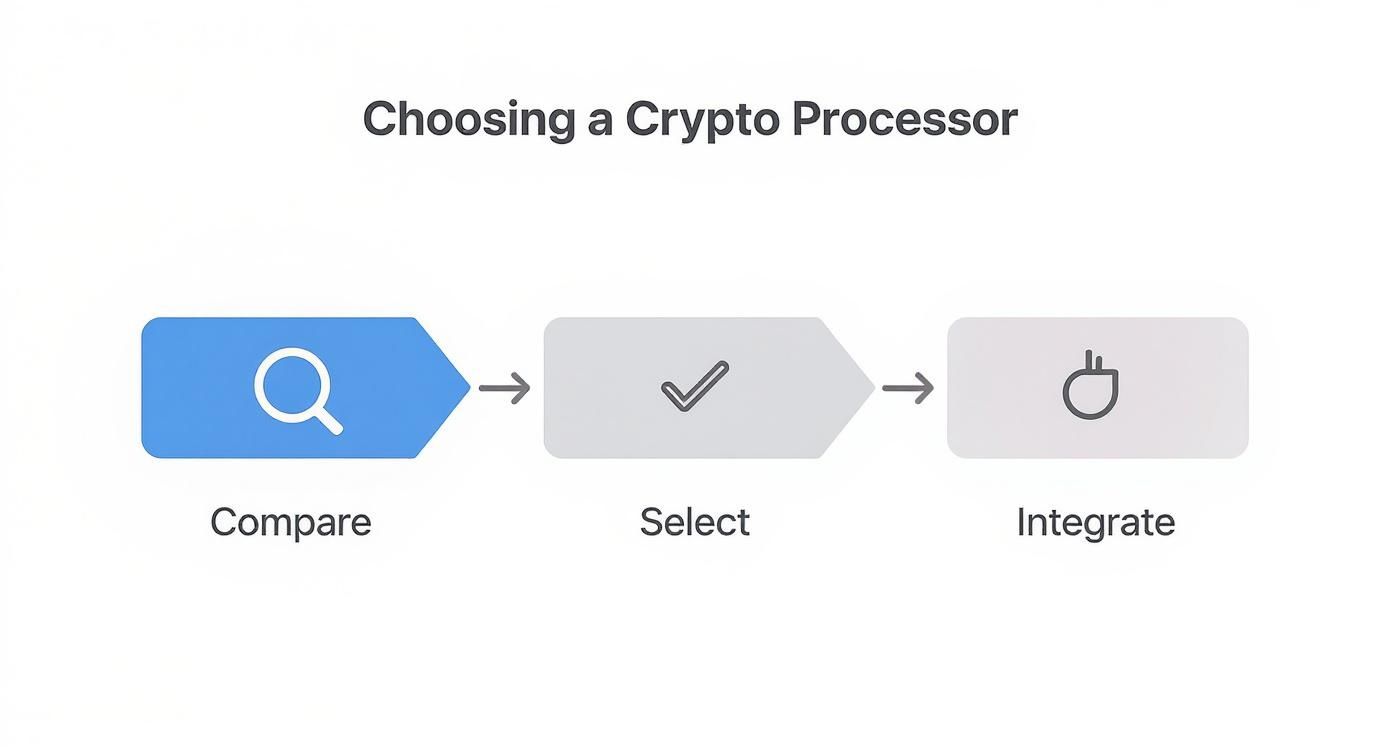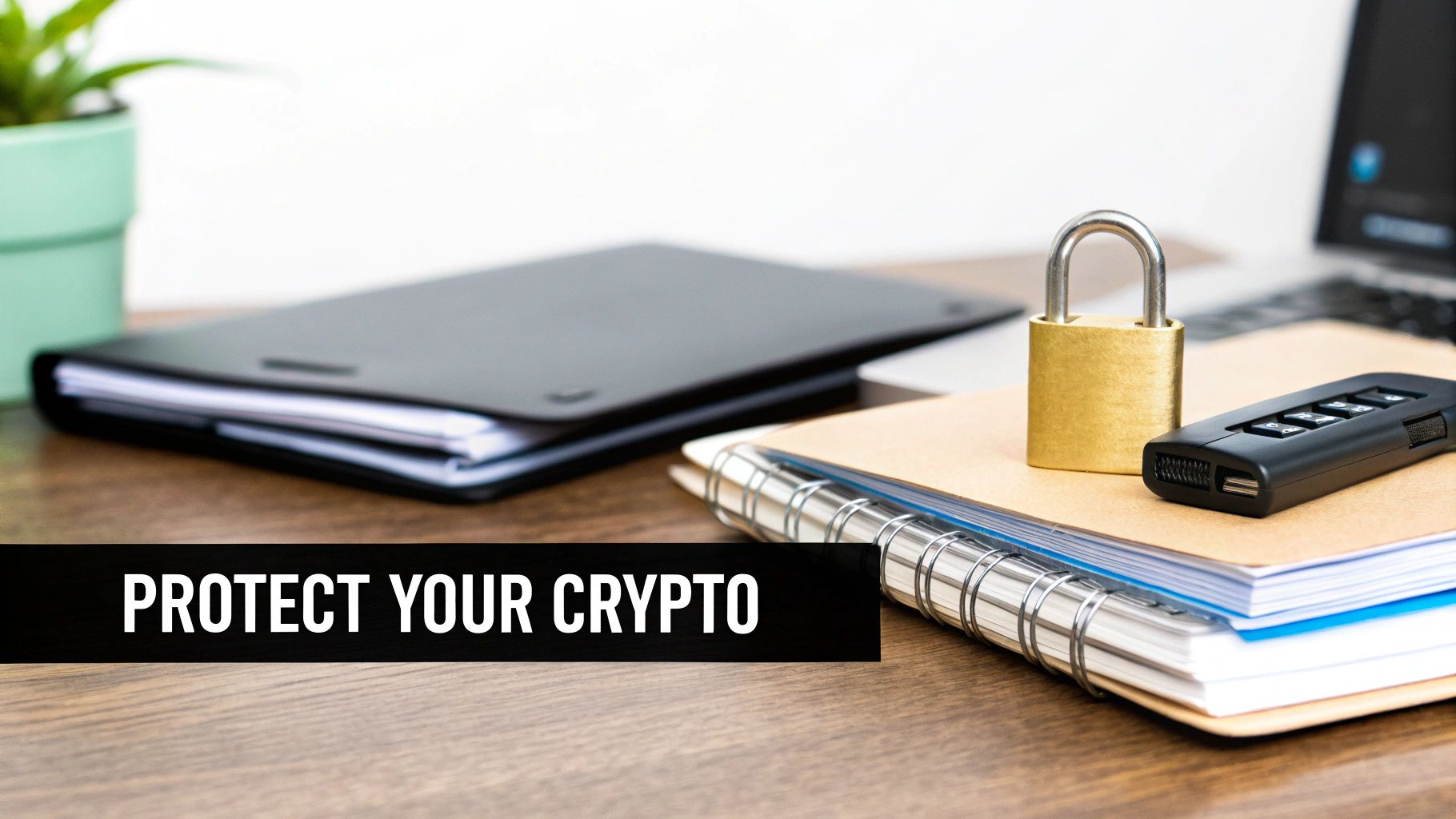
Accept Crypto Payments For Business A Practical Guide
Thinking about accepting crypto at your business? It’s a lot easier than you might imagine. Modern crypto payment processors do all the heavy lifting, handling the entire transaction from start to finish.
They’ll convert crypto into cash for you instantly and plug right into the e-commerce platforms you already use, like Shopify or WooCommerce. This lets you reach a whole new group of customers without having to worry about the market's price swings.
Why Accepting Crypto Is a Smart Business Move

Let's cut through the hype. The real reasons to accept crypto are practical and can benefit your business right now—this isn't just about betting on the future. It’s a strategic choice that can boost your revenue and make your operations run smoother.
One of the biggest draws? The potential for much lower transaction fees. We've all seen those credit card processing statements, where fees can easily be 2.9% + $0.30 for every single sale. Crypto processors, on the other hand, often charge just 1% or even less. That difference goes straight to your bottom line.
Expand Your Customer Reach
Adding a crypto payment option instantly makes your business attractive to a growing, global community of tech-forward shoppers. These are people who value the speed and privacy of digital currencies and actively look for merchants who cater to them. This isn't some tiny niche; it's a worldwide market with serious spending power.
If you sell online, this is a game-changer for international sales. You can sell to someone on the other side of the world without the headache of currency conversion fees or waiting on slow, archaic bank transfers. Crypto transactions get confirmed and settled fast, no matter where your customer is.
"Stablecoin payments help us reduce our cost of revenue for payments from all around the globe, attract more tech-forward users, and reach folks who don’t have access to other payment methods." — Alex Mashrabov, CEO, Higgsfield
Core Business Advantages
Getting on board with crypto payments does more than just bring in new faces. It tackles some of the most persistent operational headaches that businesses deal with every day.
- No More Chargebacks: Once a blockchain transaction is confirmed, it’s final. It can’t be reversed. This is huge. It means you’re protected from the fraudulent chargeback claims that eat into profits and cause endless administrative work.
- Get Your Money Faster: Traditional bank transfers can feel like they take forever, especially across borders. Crypto payments usually settle in a matter of minutes, which dramatically improves your cash flow and gives you quicker access to your money.
- Stronger Security: When handled correctly, crypto offers excellent security. Customers pay you directly from their digital wallets, so they never have to share sensitive credit card numbers or personal data with you, which lowers the risk of a data breach.
Of course, it’s wise to understand the bigger picture, including the global regulatory environment. Getting familiar with the landscape of cryptocurrencies in key financial centers like Hong Kong can provide valuable context. At the end of the day, deciding to accept crypto payments is about getting your business ready for the next evolution of commerce.
Choosing Your Crypto Payment Processor
Picking the right crypto payment processor is hands-down the most critical decision you'll make when you start to accept crypto payments for business. This partner becomes the backbone of your crypto operations, handling all the technical heavy lifting so you can stay focused on what you do best: running your company.
Don't get bogged down by the sheer number of options out there. Instead, let's cut through the noise and zero in on the features that will actually make a difference to your bottom line and daily workflow.
First up, the fee structure. It's true that most crypto processors have lower fees than traditional credit cards, but the devil is in the details. Some offer a simple, flat 1% fee, which is easy to understand. Others might use a tiered system or tack on extra charges for converting crypto to fiat currency. Always dig into their pricing page to get a clear picture of what you'll actually be paying per transaction.
Comparing Core Features and Capabilities
Beyond the fees, you need a processor that fits your business like a glove. The needs of a small online store are completely different from those of a large enterprise, so it's smart to compare providers on a few practical metrics.
Here’s what I always tell people to look for:
- Supported Cryptocurrencies: Does the gateway support the coins your customers actually want to use? You'll obviously want the big ones like Bitcoin (BTC) and Ethereum (ETH). But don't overlook the rising demand for stablecoins like USDC and USDT, which are pegged to the dollar and eliminate price swings for both you and your customer.
- E-commerce Integrations: How painless is the setup? The best providers have ready-made plugins for platforms like Shopify, WooCommerce, and Magento. A one-click installation can save you a ton of development headaches and money.
- Settlement Options: Decide if you want to hold onto the crypto or cash out immediately. Many services offer automatic conversion, sending USD or EUR straight to your bank account. This is a game-changer if you want to avoid dealing with crypto's infamous price volatility.
The recent explosion in crypto adoption makes finding a solid partner more important than ever. In the United States alone, businesses saw crypto transaction activity jump by roughly 50% in the first half of the year. If you're curious about what's driving this, the full TRM Labs report on crypto adoption and stablecoin usage is a fascinating read.
To help you visualize the differences, let's compare a few leading processors side-by-side.
Crypto Payment Processor Feature Comparison
This table breaks down some of the most popular options, giving you a quick snapshot of what they offer. It’s a great starting point for figuring out which one aligns best with your specific business needs.
| Processor | Transaction Fees | Supported Coins | Settlement Options | E-commerce Integrations |
|---|---|---|---|---|
| BlockBee | No fees (network fees only) | BTC, ETH, USDT, USDC, TRX & more | Direct to wallet (non-custodial) | WooCommerce, WHMCS, Shopify |
| Coinbase Commerce | 1% flat fee | BTC, ETH, LTC, USDC, DOGE & more | USD, EUR, GBP | Shopify, WooCommerce |
| BitPay | 1% flat fee | BTC, ETH, DOGE, LTC, SHIB & more | USD, EUR & other fiat currencies | Shopify, Magento |
| NOWPayments | Starts at 0.4% | 150+ cryptocurrencies | Direct to wallet or Fiat conversion | WooCommerce, Shopify, OpenCart |
Keep in mind that this is just a high-level overview. Always visit their official sites to get the most current information on fees and features before making a final decision.
Security and Support are Non-Negotiable
When it comes to handling money, security is one area where you absolutely cannot cut corners. Your processor needs a rock-solid reputation for protecting merchant funds and customer data. Look for must-have features like two-factor authentication (2FA) and secure API keys. I also strongly recommend looking at non-custodial solutions—these give you full control over your funds, meaning the processor never holds your money.
For example, here’s a peek at the dashboard for Coinbase Commerce, a popular choice for many businesses getting started.
A clean, intuitive interface like this one is more than just nice to look at; it makes tracking payments and reconciling your books so much easier.
Just as crucial is customer support. You can’t afford to wait three days for an email response when a customer's payment is stuck. Before you commit to a service, test out their support. Send a pre-sales question. See how quickly and effectively they respond. A processor with a responsive and knowledgeable team can be a true lifesaver when you need help.
For a deeper look at the top players in the space, our guide on the best crypto payment gateways offers detailed reviews to help you choose with confidence.
Bringing Crypto Payments to Your Storefront
Alright, you've selected a payment processor. Now for the fun part: getting it all hooked up. This is where the rubber meets the road, but don't worry—you don't need to be a developer to get this done. If you've ever set up a new app on your Shopify store, you've got the skills for this.
At its core, the process is pretty simple. You'll create an account with your chosen processor, find a unique code called an API key, and then plug that key into your website's backend. Think of the API key as a secure handshake between your store and the processor, letting them talk to each other without sharing sensitive data.
A successful setup hinges on a solid ecommerce platform integration. When the connection is seamless, customer payments go through without a hitch, and your sales records stay perfectly in sync. It’s the key to a smooth experience for everyone involved.
Integrating With Your E-commerce Platform
Let's imagine you run a Shopify store. You've picked a processor that, thankfully, has a dedicated Shopify plugin. Your first move is to sign up for an account on the processor’s website.
After you're verified, you'll need to poke around your new dashboard for a section called "API," "Integrations," or maybe "Developer Tools." This is where you'll generate your API keys. You'll typically get two: a public key and a secret key.
Crucial Tip: Guard your secret API key like you would your bank password. Never, ever share it in an email or post it publicly. It’s the literal key to your payment kingdom, so keep it locked down.
With your keys copied, pop over to the Shopify App Store and install your processor's official plugin. The plugin’s settings page will have fields waiting for you to paste in your API keys. Do that, hit save, and you're just about there. For a more granular breakdown, check out our guide on how to add crypto payments to your website.
This whole process—from research to going live—is about connecting the dots.

As you can see, the integration step is the final hurdle after you've done your homework and picked the right partner.
Configuring Your Business Wallet
The last piece of the puzzle is telling the processor where to send the crypto you receive. You’ll do this by adding your business’s wallet addresses inside the processor’s dashboard.
Here’s what that looks like in practice:
- First, find the "Wallets," "Payouts," or "Settlements" section in your account settings.
- Next, you'll add the public wallet address for each cryptocurrency you want to accept—one for Bitcoin, one for Ethereum, another for USDC, and so on. Triple-check these addresses. One wrong character, and your funds could be lost forever.
- Finally, if your processor handles fiat conversion, you’ll link your bank account here and set your settlement schedule—whether you want payouts daily, weekly, or on another timeline.
If you’re using a non-custodial processor, customer payments will land directly in your wallet almost instantly. With a custodial service, they'll hold the funds for you and pay them out according to the schedule you just set.
Run a small test transaction to make sure everything is flowing correctly, and that's it. Your business is officially ready to accept crypto payments.
Managing Crypto Security and Compliance

Once you're set up to accept crypto payments for business, your job isn't done. In fact, some of the most critical work is just beginning. Protecting your digital assets and navigating the maze of financial regulations are non-negotiable. Getting this right is what separates a sustainable business from one that runs into serious, and often expensive, trouble down the road.
Your first line of defense is how you manage your wallets. This really comes down to one big decision: custodial or non-custodial? A custodial wallet is where a third party, like a crypto exchange, holds your private keys for you. It's convenient, but it also means you're trusting them completely with your money. If they get hacked or go under, your funds could be at risk.
On the other hand, a non-custodial wallet gives you sole control over your keys, which means you have sole control over your funds. For any business holding a meaningful amount of crypto, I always recommend a hardware wallet. These are physical devices that keep your private keys completely offline, making them virtually immune to online attacks. Think of it as your own personal Fort Knox for digital cash.
Staying on the Right Side of Regulations
The compliance side of things can seem daunting, but it really boils down to a couple of core concepts: Know Your Customer (KYC) and Anti-Money Laundering (AML). These aren't just buzzwords; they're global standards designed to stop financial crime.
Your payment processor will likely handle a lot of the initial KYC legwork when you sign up. That's a huge help. But the responsibility doesn't end there. You still need to keep an eye on your transactions for anything that looks suspicious. Getting a handle on the basics of anti-money laundering transaction monitoring will equip you to spot red flags and prevent your business from being used for illicit activities.
Meticulous record-keeping is your best friend here. Every single transaction, every conversion from crypto to fiat, and every settlement needs to be logged. This isn't just about being ready for tax season; it's about having a crystal-clear audit trail if a regulator ever questions your operations.
This global push for compliance is happening for a reason—crypto adoption is on the rise. A recent Chainalysis report found that the global average for businesses accepting crypto payments hit 4.3%, a solid jump from 2.8% just the year before.
Tax Reporting for Crypto Transactions
Finally, let's talk taxes. This is where a lot of businesses get tripped up. In most countries, tax authorities like the IRS treat cryptocurrency as property, not as currency. This single distinction changes everything about how you handle your accounting.
When a customer pays you in Bitcoin, for example, you have to record the fair market value of that Bitcoin in your local currency at the very moment the transaction happened. That dollar amount is what you report as gross income for the sale.
Here’s a practical checklist to keep your records straight:
- Timestamp Everything: Log the exact date and time of every payment you receive.
- Record the Fiat Value: Note the value in your local currency (USD, EUR, etc.) at that precise moment.
- Track Your Conversions: If you sell that crypto for cash later, that's a separate taxable event. If the crypto's value went up between when you received it and when you sold it, you likely have a capital gain to report.
My best advice? Don't go it alone. Find an accountant who actually understands digital assets. Their expertise is worth its weight in gold and will save you countless headaches, keeping you compliant and free to focus on growing your business.
Navigating Price Volatility with Fiat Settlements
Let's be honest, the biggest hurdle for most businesses dipping their toes into crypto is the wild price swings. You see the headlines—Bitcoin soaring one day, plunging the next—and naturally wonder how you could ever manage a stable balance sheet with that kind of unpredictability. It’s a completely valid concern.
Thankfully, you don't have to ride that rollercoaster. Modern crypto payment processors have a brilliant, built-in fix for this: automatic fiat settlements. Think of this as your secret weapon. It allows you to accept crypto payments for business without actually holding the volatile asset.
The process is incredibly slick. A customer buys a $100 product from your store using Ethereum. The moment they pay, the payment gateway locks in that $100 value. It then handles the conversion behind the scenes, turning the crypto into your preferred currency—USD, EUR, you name it—and sends it straight to your business bank account.
The Power of Instant Conversion
The real magic here is that you're completely shielded from market risk. You're not left holding a bag of crypto, nervously watching the price charts. The second that transaction gets the green light, your revenue is secured in the stable currency you already use for payroll, inventory, and everything else.
This setup genuinely offers the best of both worlds. You can open your doors to a growing global market of crypto users and enjoy much lower transaction fees, all without sacrificing the predictable cash flow your business depends on.
By opting for fiat settlements, you are essentially using crypto as a payment rail—a faster, cheaper, and more global way to move money—without exposing your business to its investment risks. Your accounting stays simple, and your revenue remains stable.
This isn't just a niche feature; it's driving serious corporate interest. We've seen a huge spike in institutional adoption, with over $12.5 billion in business Bitcoin inflows recorded in just the first eight months of the year. This boom is happening because the financial tools and regulations are finally catching up, making it safer and easier for companies to get on board. If you want to dig deeper into the numbers, you can explore the full business treasury strategy report for some great insights.
Setting Up Your Settlement Preferences
Getting this all configured is usually a breeze right from your payment processor’s dashboard. During the initial setup, you'll simply link your business bank account and decide how often you want to get paid.
You'll typically run into a few common options:
- Instant Settlement: As soon as a transaction clears, the funds are converted and sent on their way to your bank.
- Daily Settlement: All of the day's transactions are batched together and paid out in a single, convenient transfer.
- Weekly/Monthly Settlement: Some providers offer this for businesses that prefer fewer, larger deposits to simplify reconciliation.
Just keep an eye on the fees. While the crypto network fees are low, there’s usually a small currency conversion or settlement fee, often around 1%. Frankly, it's a tiny price to pay for total immunity from volatility, and it’s almost always cheaper than what you're paying for credit card processing.
With automatic fiat settlements in place, you can welcome crypto customers with open arms, knowing your bottom line is always protected.
Common Questions About Crypto Payments
It's smart to ask questions before jumping into something new. Even with the obvious upsides, you've probably got a few things on your mind about accepting crypto. That’s a good sign—it means you’re taking it seriously.
Let's walk through some of the most common questions business owners ask when they're on the fence. My goal here is to give you straight, practical answers to help you get started with confidence.
What Are the Tax Implications of Accepting Crypto?
This is usually the first question, and for good reason. Most tax authorities, like the IRS in the US, don't see crypto as money—they see it as property. This is a key distinction.
When a customer pays you in crypto, you need to record the fair market value of that crypto in your local currency at the moment of the transaction. That figure is what you report as gross income.
Now, if you decide to hold onto that crypto instead of cashing it out immediately, and its value goes up, you could be looking at capital gains tax on the profit. A good payment processor will give you detailed reports to make this easier, but I always recommend talking to a tax professional who knows their way around digital assets. It’s a small investment that can save you major headaches.
How Do I Handle Customer Refunds for Crypto Payments?
Refunding a crypto payment is more straightforward than you might think. Most crypto payment gateways have this function built right in. You’ve typically got two ways to go about it: refund the exact crypto amount the customer sent, or refund the equivalent fiat value from the time of purchase.
My advice? Make your refund policy crystal clear on your website. I find that refunding the original fiat value (e.g., the $50 they spent) is the cleanest approach. Crypto prices bounce around, and this method avoids any potential disputes over price fluctuations. It keeps things simple and fair for everyone involved.
Are Crypto Transactions Really Irreversible?
Yes, they are. Once a transaction gets its confirmations on the blockchain, it's set in stone. It cannot be reversed.
For business owners, this is a huge plus. It practically eliminates chargeback fraud, which is a constant pain point for anyone who's ever dealt with credit card disputes.
The finality of blockchain transactions puts you back in the driver's seat. Once the payment hits your wallet and the network confirms it, it’s yours. This also means you handle any legitimate refunds directly with your customer—there's no bank acting as a middleman.
Do I Need to Be a Tech Expert to Set This Up?
Not at all. The tools we have today are built for business owners, not blockchain engineers. If you can handle installing a plugin on your Shopify or WordPress site, you have all the technical skill you need.
Honestly, the setup usually just boils down to a few simple steps:
- Sign up for an account with a payment processor.
- Grab the unique API key from your new dashboard.
- Paste that key into your e-commerce platform's payment settings.
- Add the wallet address where you want to receive your funds.
The processor does all the heavy lifting in the background. They’ve made it incredibly easy to get going.
Ready to unlock global customers and lower your fees? BlockBee provides a secure, non-custodial crypto payment gateway that integrates seamlessly with your existing e-commerce setup. Start accepting crypto payments today.
